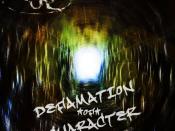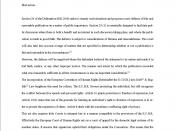Introduction
"He called me stupid! I'm going to sue him for slander!" The previous example is something that an ill informed person might say. However, really what is libel and slander and how does one know when someone has committed libel/slander? This report will address the history of libel/slander laws, what actions constitute defamation, what are the defences used with defamation, what is a public figure, who is a public figure, and what private figures needed to do to prove defamation. The aim of this report is to address all points of defamation cases and to generally inform readers what these two words mean in legal terms.
History
What is libel and slander? For most people they are just words used when someone says something bad about you. To an extent this assumption is correct however, to really understand libel/slander one must first take a look at it origins. In the earliest system of law offences associated with verbal injuries were taken very seriously.
In fact, often times it was considered a criminal offence or at least a quasi-criminal offence. The seriousness of such crimes does not come from the monetary loss, which can be made up through compensation, but from the loss of honour. Some of the earliest law, from the Twelve Tables, state that the composition of offensive songs and deliberate attempts of mockery were punishable by death. Similar but minor offences were tried under the concept of injuria, which cover all forms of direct attack that cause abuse or insult. In Roman times verbal injuries were dealt with in one of two categories. The first deals with cases where the offence lies in the unprovoked defamatory remark made in public. In these cases it does not matter if the statement was true or not as long as...


